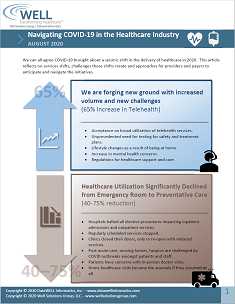In the News
Stories and trends changing the healthcare landscape
Navigating COVID-19 in the Healthcare Industry
We can all agree COVID-19 brought about a seismic shift in the delivery of healthcare in 2020. This article reflects on services shifts, challenges those shifts create and approaches for providers and payers to anticipate and navigate the initiatives.
CMS cancels two mandatory pay models and scales back a third
 CMS is planning to reduce mandatory bundles based on results, provider feedback and “minimum” utilization considerations. Some programs will be cancelled, some will not launch in 2018 and one is being scaled back.
CMS is planning to reduce mandatory bundles based on results, provider feedback and “minimum” utilization considerations. Some programs will be cancelled, some will not launch in 2018 and one is being scaled back.
At the same time, we are helping our clients achieve great success building population health risk based management solutions. Let us help you identify your opportunities to improve outcomes and reduce the cost of healthcare.
http://www.modernhealthcare.com/article/20170815/…/170819935
Reducing Post Acute Costs for Mandatory CMS Joint Replacement Bundle
 “Looking for ways to reduce your post acute costs for the Mandatory CMS Joint replacement bundle? New products are entering the market that allow providers to gauge progress without onsite visits…in surprising ways. Microsoft Kinect shifts from gauging your dance moves to measuring your gait and recovery from hip or knee replacement. In addition, tracking and providing on demand rehabilitation therapy programs with instant feedback. Tell us what you think!Read More.
“Looking for ways to reduce your post acute costs for the Mandatory CMS Joint replacement bundle? New products are entering the market that allow providers to gauge progress without onsite visits…in surprising ways. Microsoft Kinect shifts from gauging your dance moves to measuring your gait and recovery from hip or knee replacement. In addition, tracking and providing on demand rehabilitation therapy programs with instant feedback. Tell us what you think!Read More.
Reimbursement for telehealth 40 percent less than for non-telehealth care
CMS Final Rule on Overpayments
 Medicare Advantage Plans, need to update your strategy? Provider responsibilities and look back periods are reduced in the CMS final rule for overpayments. See more information:
Medicare Advantage Plans, need to update your strategy? Provider responsibilities and look back periods are reduced in the CMS final rule for overpayments. See more information:
The Centers for Medicare & Medicaid Services has issued a final rule regarding the legal requirements providers most follow if they are overpaid.
Medicare contractors overpaid $35.8 million for outpatient drugs
 Medicare uncovers claims overpayments due to incorrect units of service and provider coding errors. CMS states Medicare contractors should collect their overpayments – how many outpatient overpayments are overlooked? Most focus on inpatient only. We can help!See More
Medicare uncovers claims overpayments due to incorrect units of service and provider coding errors. CMS states Medicare contractors should collect their overpayments – how many outpatient overpayments are overlooked? Most focus on inpatient only. We can help!See More
New Ideas for Population Health Analytics Using Persona-Based Model
 Some Health Plans are charting new territory in population health management: Member centric clinical persona. In the traditional disease/condition categorization, many members were in separate and unconnected programs. The nine clinical personas are: healthy kids, healthy adults, acute kids and adults, ADD High-Cost/Rx, Serious Mental Illness/Substance Abuse/Other At-Risk, Uncoordinated Care, Chronic Coordinated, Complex Managed and Extreme Complex. We find the approach compelling. Read More.
Some Health Plans are charting new territory in population health management: Member centric clinical persona. In the traditional disease/condition categorization, many members were in separate and unconnected programs. The nine clinical personas are: healthy kids, healthy adults, acute kids and adults, ADD High-Cost/Rx, Serious Mental Illness/Substance Abuse/Other At-Risk, Uncoordinated Care, Chronic Coordinated, Complex Managed and Extreme Complex. We find the approach compelling. Read More.
ICD-10 “More Specific” Diagnosis/ Symptom/ Injury Codes
 Which “more specific” diagnosis/symptom/injury code is your favorite with the release of ICD-10 in October?
Which “more specific” diagnosis/symptom/injury code is your favorite with the release of ICD-10 in October?
At Well Solutions Group, we picked “Pecked by a Chicken”, but “Bitten by a Cow” was a close second. Read More
Medicaid Health Plans Face Quality And Performance Ratings
 Proposed Medicaid Managed Care Organization regulations include quality ratings for private plans providing benefits, in addition to provider network certification and member education. These changes are aligned with Medicare plan requirements, although well behind the rest of the CMS programs focused on quality of care while reducing overall costs. However, Medicaid reimbursement levels are lower posing larger challenges. Will quality measures be less robust? Read More.
Proposed Medicaid Managed Care Organization regulations include quality ratings for private plans providing benefits, in addition to provider network certification and member education. These changes are aligned with Medicare plan requirements, although well behind the rest of the CMS programs focused on quality of care while reducing overall costs. However, Medicaid reimbursement levels are lower posing larger challenges. Will quality measures be less robust? Read More.
How Data and DNA Are Making Cancer Treatment a Personal Issue
T he power of data to help personalize optimal treatment for cancer is exciting; yet even more exciting is the ability to prevent it. Even though the health care industry recognizes the risks to quality of life as well costs associated with a disease event, innovation and pro-active care will need to address proven/necessary treatment and the timing of the costs when health plan benefits are annual. Not only providers of care, but also employer groups, individuals, and multi-year government innovation will likely need to play the role of change agents.Read the story.
he power of data to help personalize optimal treatment for cancer is exciting; yet even more exciting is the ability to prevent it. Even though the health care industry recognizes the risks to quality of life as well costs associated with a disease event, innovation and pro-active care will need to address proven/necessary treatment and the timing of the costs when health plan benefits are annual. Not only providers of care, but also employer groups, individuals, and multi-year government innovation will likely need to play the role of change agents.Read the story.



 Reimbursement for telehealth services is much lower than non-telehealth care, according to a recent policy
Reimbursement for telehealth services is much lower than non-telehealth care, according to a recent policy